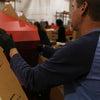

In today’s world, sustainability has transitioned from being a buzzword to a vital necessity, with industries worldwide striving to reduce their environmental footprint. Among these efforts, sustainable packaging has emerged as a critical focus area, especially in growing consumer awareness and demand for eco-friendly products.
One of the pivotal moments in this movement is FSC® Forest Week, an initiative dedicated to promoting responsible forest management and highlighting the importance of products sourced from well-managed forests.
This blog delves into the significance of sustainable packaging, its relevance to FSC® Forest Week, and how businesses and consumers can contribute to a greener future.
Table Of Contents
The Importance of Sustainable Packaging
Packaging plays a fundamental role in the modern economy. It protects products, provides information, and is integral to branding and consumer experience. However, traditional packaging materials, especially single-use plastics, have significantly contributed to environmental degradation.
Landfills are overflowing with packaging waste, oceans are plagued by plastic pollution, and the carbon footprint of packaging production is a major concern in the fight against climate change.
Sustainable packaging offers a solution to these issues by minimizing environmental impact throughout its lifecycle. This encompasses the use of renewable resources, reducing material usage, and ensuring that packaging can be recycled or composted after use.
The goal is to create a circular economy where packaging materials are reused, repurposed, and kept out of landfills.
Understanding FSC® Certification
The Forest Stewardship Council (FSC®) is a global non-profit organization promoting responsible forest management. FSC certification ensures that products come from responsibly managed forests that provide environmental, social, and economic benefits.
FSC®-certified forests are managed to maintain biodiversity, productivity, and ecological processes while respecting the rights of indigenous peoples and workers.
FSC® certification is particularly relevant in the context of sustainable packaging. Many packaging materials, such as paper and cardboard, are derived from wood.
By choosing FSC®-certified materials, companies can ensure that the wood used in their packaging is sourced from forests that are managed sustainably.
The Relevance of FSC® Forest Week
FSC® Forest Week is an annual event that raises awareness about the importance of forests and the need for responsible forest management.
It is a week-long celebration highlighting the role forests play in sustaining life on Earth, from providing clean air and water to serving as habitats for countless species.
FSC® Forest Week also emphasizes the role consumers and businesses play in supporting sustainable forest management through their purchasing decisions.
During FSC® Forest Week, the focus is on promoting products that carry the FSC® label, which assures consumers that the product they are buying is made from responsibly sourced materials.
This is particularly significant for the packaging industry, where the demand for paper-based materials is high. By choosing FSC-certified packaging, companies and consumers alike can contribute to preserving forests and promoting sustainable practices.

Sustainable Packaging Role in Forest Conservation
Forests are critical to the health of our planet. They act as carbon sinks, absorbing carbon dioxide and helping to mitigate climate change. They also support biodiversity, regulate water cycles, and provide livelihoods for millions of people. However, deforestation and forest degradation continue to pose significant threats to these vital ecosystems.
Sustainable packaging can play a crucial role in forest conservation. Using FSC®-certified materials, packaging companies can ensure that the forests from which they source their materials are managed responsibly. This not only helps preserve forests but also supports the communities that depend on them.
Moreover, sustainable packaging often involves reducing the amount of material used, which can decrease the demand for raw materials and, consequently, the pressure on forests. Innovations in packaging design, such as lightweighting and alternative materials like recycled paper, further contribute to this effort.
Related: What Is FSC® Certified Material?
Consumer Influence on Sustainable Packaging
Consumers play a critical role in the transition to sustainable packaging. With increasing awareness of environmental issues, more consumers are demanding products with minimal environmental impact.
This shift in consumer preferences has driven companies to adopt more sustainable packaging solutions.
When consumers choose products with sustainable packaging, they send a powerful message to companies about the importance of environmental responsibility.
By opting for products with FSC®-certified packaging, consumers can directly contribute to forest conservation and the promotion of sustainable practices.

The Future of Sustainable Packaging
The future of sustainable packaging looks promising as technological advancements and increasing consumer demand drive innovation in the industry. Several trends are shaping the future of sustainable packaging, including:
Biodegradable and Compostable Packaging
Biodegradable and compostable materials are becoming increasingly popular as alternatives to traditional plastics. These materials break down naturally and reduce the burden on landfills and oceans.
Companies are investing in research and development to create more effective and affordable biodegradable packaging solutions.
Recycling and Circular Economy
The concept of a circular economy, where materials are reused and recycled indefinitely, is gaining traction.
In packaging, this means designing products that can be easily recycled and integrating recycled materials into new packaging.
Governments and businesses are working together to improve recycling infrastructure and increase the use of recycled content in packaging.
Smart Packaging
Smart packaging technologies, such as QR codes and RFID tags, are being used to provide consumers with information about the sustainability of the packaging and the product itself.
These technologies can also help optimize supply chains, reduce waste, and enhance recycling efforts.
Minimalist Packaging
Minimalist packaging focuses on reducing the amount of material used without compromising the product's safety or integrity.
This trend is driven by both environmental considerations and cost savings. Companies are exploring innovative ways to package products using less material while still providing a positive consumer experience.
Related: Top 10 Tips To Make Your Packaging More Sustainable
Outlook Moving Forward
Sustainable packaging is not just a trend; it is a necessity in the fight against climate change and environmental degradation. FSC® Forest Week serves as a reminder of forests' critical role in our planet’s health and the importance of responsible forest management.
By choosing FSC®-certified packaging and supporting companies that prioritize sustainability, businesses and consumers can significantly contribute to forest conservation and the transition to a more sustainable future.
As we look toward the future, the packaging industry will continue to evolve, driven by innovation, consumer demand, and a collective commitment to sustainability.
Whether through adopting new materials, integrating recycling technologies, or promoting responsible sourcing, every step towards sustainable packaging is a step towards a healthier planet.
It is up to all of us—businesses, governments, and consumers alike—to take action and ensure that the packaging we use today does not come at the expense of tomorrow’s environment.
Bennett Creates Sustainable Packaging!
The corrugated packaging industry is making substantial strides toward enhancing sustainability. With ongoing efforts and innovations, we can anticipate even more significant advancements in this field in the near future.
If your business is seeking a more sustainable packaging solution, Bennett is here to help.
We offer packaging options that are not only environmentally responsible but also maintain the highest standards of quality and performance.





